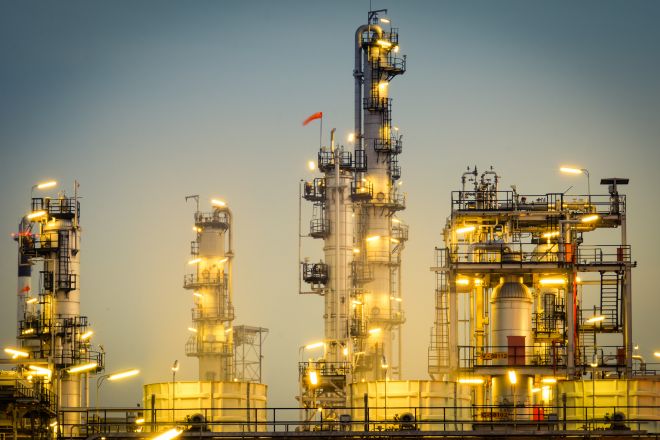Drone Attacks Lead to Heightened Middle East Tensions
Published on October, 51 2019
Oil refinery facility at night. Shutterstock.com.
By Ellen Rosser
Middle East Committee
Since 2014, Saudi Arabia and, until very recently, the United Arab Emirates (UAE), have waged war with US support against the Houthi* rebels in Yemen. The attacks have resulted in a massive humanitarian disaster in Yemen, caused in part by the attacking countries’ violations of international law as they have attacked hospitals, schools, and markets. Because of the fighting, over 85,000 children have died of starvation. Many more civilians — children and adults — have died from the effects of cholera and starvation.
The Houthis have been attacking back. Since January 2018, they have launched fifteen drone or missile attacks on Saudi Arabia, on airfields, oil facilities, and military targets, most of which were stopped by Saudi defenses. However, on September 13, 2019, pre-dawn drone attacks claimed by the Houthis caused fires at two major oil facilities run by Saudi Aramco. (Read an AP report in The Guardian, "Major Saudi Arabia Oil Facilities Hit by Houthi Drone Strikes"). Although Trump and others blamed Iran, the attacks are similar to but more successful than others launched by the Houthis.
Saudi Aramco, the state-run oil company, describes its Abqaiq oil processing facility there as “the largest crude oil stabilization plant in the world.” The Houthi drone attack cut the Saudi kingdom’s output by 5.7 million barrels per day (bpd), according to a statement from Saudi Aramco, or more than 5% of global oil supply. Although the Saudis extinguished the fires and resumed oil production fairly quickly, the stock market dipped briefly and oil and gas prices have risen, including in the US.
In a September 16, 2019, article on the website foreignpolicy.com titled "What You Need to Know About the Attacks on Saudi Oil Facilities", Robbie Gramer, Elias Groll, and Amy MacKinnon write, “So far, attacks attributed to Iran haven’t resulted in a military confrontation with the United States.” But the article also reports Trump threatens that “the U.S. military is 'locked and loaded' to strike back.”
“Amid his ongoing standoff with Iran, Trump has declared that the loss of American life represents a red line for military retaliation,” the article states. Though “investigations are still ongoing to determine the source of the attack,” the Saudi Foreign Ministry said “initial investigations have indicated that the weapons used in the attack were Iranian weapons.”
The Houthis recently stated they would not continue such attacks if Saudi Arabia would cease attacking them. Although many consider the war in Yemen to be a proxy war between Saudi Arabia and Iran, one can only hope that the Saudis will respond positively to the Houthis’ offer and let the people of Yemen live in peace.
Action Requested: The Middle East Committee urges members to write to their elected officials to urge the United States to exercise restraint and to not rush to judgment in regard to the strikes against Saudi oil facilities. U.S. retaliation, especially if directed against Iran, could result in a dangerous escalation of hostilities in the region, which some observers have indicated could put us on the threshold of World War III.
*The Houthis--officially "Ansar Allah" (Partisans of God) are a rebel group/tribe in Yemen who follow Zaidism, a branch of Shi'a Islam that represents about 30-40% of Yemen’s population.



